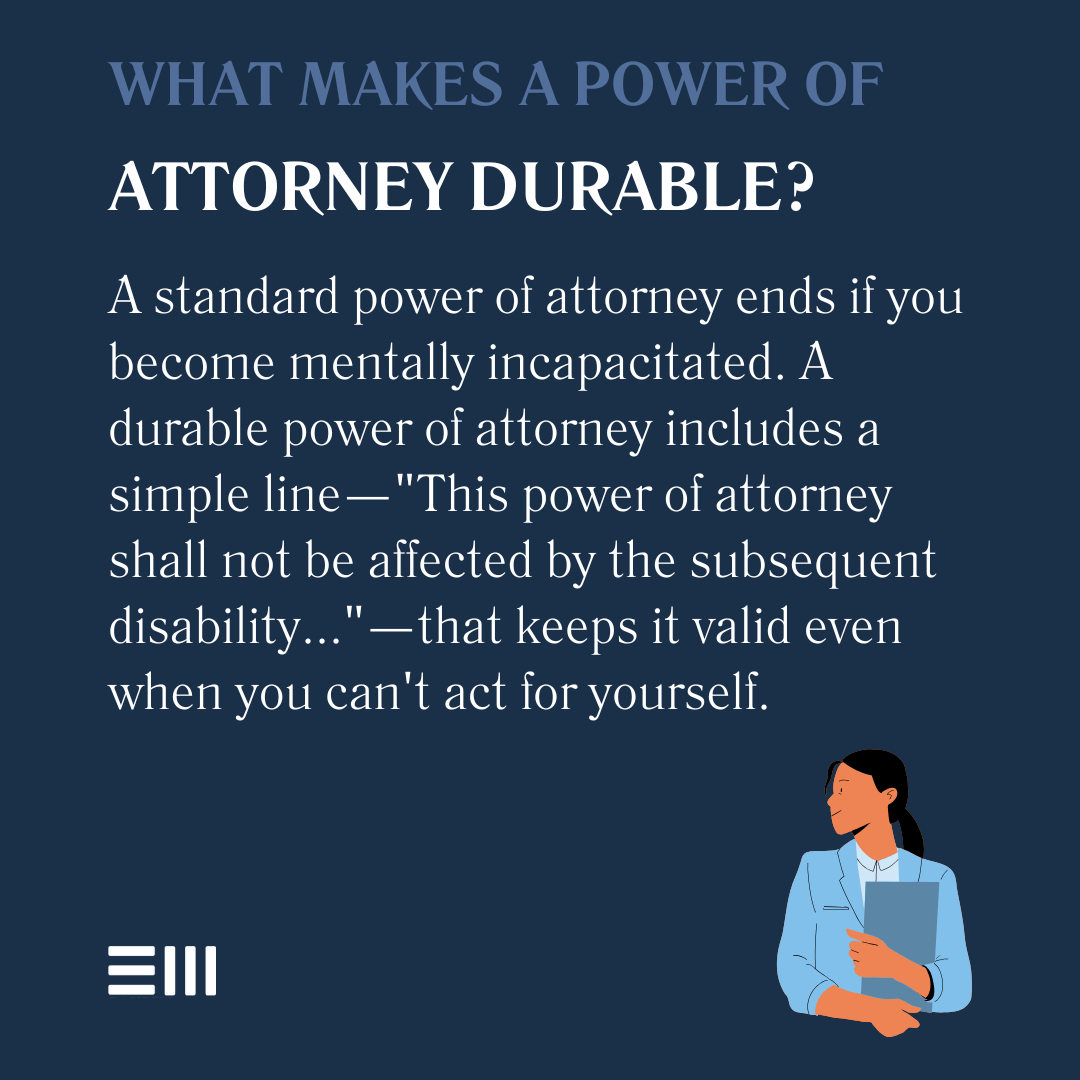Benjamin Franklin once noted, "In this world, nothing is certain except death and taxes." While Franklin's wisdom endures, modern life has introduced a third certainty: the need to prepare for unexpected incapacity.
When Alabamians find themselves unable to make decisions—whether temporarily or permanently—the distinction between standard and durable powers of attorney becomes not merely a legal technicality but a critical lifeline for families navigating difficult circumstances.
Understanding Powers of Attorney in Alabama
Powers of attorney serve as foundational legal instruments that allow one person to act on behalf of another in financial, medical, or personal matters.
These documents establish a fiduciary relationship between the principal (the person granting authority) and the agent (the person receiving authority to act).
Standard Power of Attorney
A standard power of attorney establishes a legal relationship that allows your designated agent to manage specified affairs on your behalf. This arrangement provides flexibility while maintaining your ultimate control over the process.
A standard power of attorney grants authority that may include:
- Managing bank accounts and investments;
- Buying, selling, or maintaining property;
- Filing tax returns;
- Making business decisions;
- Handling insurance claims; and
- Accessing government benefits.
However, standard powers of attorney come with a significant limitation: they automatically terminate if you become mentally incapacitated. This restriction exists because the law presumes that an incapacitated person can no longer supervise the agent's actions, potentially leaving you without representation when you need it most.
Durable Power of Attorney in Alabama
A durable power of attorney fundamentally changes the equation by including specific language that keeps the authority intact even if the principal becomes mentally incapacitated. This crucial distinction makes it an essential component of comprehensive estate planning.
The durability provision typically states something similar to: "This power of attorney shall not be affected by the subsequent disability or incompetence of the principal." With this language, your chosen agent can continue making decisions on your behalf during periods when you cannot express your wishes.
Alabama law specifically recognizes durable powers of attorney under the Alabama Uniform Power of Attorney Act, providing clear guidance on their creation and enforcement. This recognition offers additional protection for both principals and agents operating under their authority.
Key Differences Highlighted
Understanding the distinction between standard and durable powers of attorney helps clarify which document serves your needs. Their differences center primarily on when and how they remain effective.
A standard power of attorney in Alabama:
- Terminates automatically upon mental incapacity;
- Requires the principal to maintain decision-making ability;
- Focuses on convenience rather than incapacity planning; and
- May be appropriate for temporary situations like military deployment or extended travel.
A durable power of attorney in Alabama:
- Continues despite mental incapacity;
- Provides continuity during health crises;
- Forms a critical part of incapacity planning; and
- Helps avoid court-supervised guardianship or conservatorship.
These fundamental differences determine which document provides the protection you need based on your specific circumstances and concerns about future incapacity.
Creating Valid Powers of Attorney in Alabama
Establishing legally binding powers of attorney in Alabama requires adherence to specific formalities to ensure their validity and enforcement.
Understanding these requirements helps prevent potential challenges to your chosen arrangements.
Legal Requirements
Alabama law establishes clear criteria for creating valid powers of attorney that will withstand scrutiny. Following these guidelines ensures your document accomplishes its intended purpose without unnecessary complications.
Under Alabama's Uniform Power of Attorney Act, a valid power of attorney must be:
- In writing.
- Signed by the principal or by another adult in the principal's conscious presence under direction.
- Notarized by a qualified notary public.
- Created while the principal is mentally competent.
Additional requirements apply to durable powers of attorney, including specific language confirming that the authority continues despite the principal's incapacity. Without this explicit durability provision, courts will interpret the document as a standard power of attorney.
When to Create These Documents
Timing plays a crucial role in establishing effective powers of attorney. Creating these documents requires proactive planning rather than reactive responses to emerging crises.
Powers of attorney should ideally be created:
- During estate planning with professional guidance;
- Before medical procedures with significant risks;
- Prior to early signs of cognitive decline;
- When establishing long-term care plans; and
- Before extended travel or military deployment.
The key consideration is that all powers of attorney must be established while you still have the mental capacity to understand their implications. Once capacity diminishes, your options become significantly more limited and expensive, potentially requiring court intervention.
Frequently Asked Questions About Powers of Attorney in Alabama
Powers of attorney often generate questions about their creation, use, and limitations.
The following information addresses common concerns for Alabamians considering these important legal tools.
Can I Have Both Types of Power of Attorney?
Navigating divorce timelines generates many questions specific to individual circumstances.
The following information addresses common concerns about Alabama's divorce waiting period and related timing considerations.
How Do I Revoke a Power of Attorney?
You can revoke a power of attorney at any time while you remain mentally competent. The revocation should be in writing, notarized, and provided to the agent and any third parties who might have relied on the original document. Financial institutions, healthcare providers, and government agencies may require proof of revocation before recognizing its effect.
What Happens if I Don't Have a Durable Power of Attorney?
Without a durable power of attorney, your family may need to petition the court for guardianship or conservatorship if you become incapacitated. This process can be expensive, time-consuming, and public. The court-appointed guardian might not be someone you would have chosen, and your family may face ongoing court supervision of your affairs.
Can My Agent Do Whatever They Want?
No, your agent must act in your best interests, maintain records, avoid conflicts of interest, and follow the specific scope of authority granted in your document. Alabama law imposes fiduciary duties on agents that require them to act with care, competence, and diligence. You can further limit their authority by including specific restrictions in your power of attorney.
Does a Power of Attorney Work After Death?
No, all powers of attorney—both standard and durable—terminate automatically upon the principal's death. After death, authority over your estate transfers to your executor or personal representative named in your will, or to a court-appointed administrator if you die without a will.
Let Justice Roll
Life's uncertainties demand thoughtful planning. Whether you're concerned about potential incapacity or simply want to ensure your affairs remain managed during temporary absence, understanding the distinction between standard and durable powers of attorney provides the foundation for making informed decisions.
At Baxley Maniscalco, our Alabama attorneys specialize in creating customized estate planning solutions that address your unique concerns. We guide you through the process of selecting and establishing the appropriate powers of attorney to protect your interests and honor your wishes.
Don't leave your future to chance.
Contact Baxley Maniscalco today to schedule a consultation with an experienced attorney who understands Alabama's legal requirements and can help you create documents that provide genuine peace of mind.


